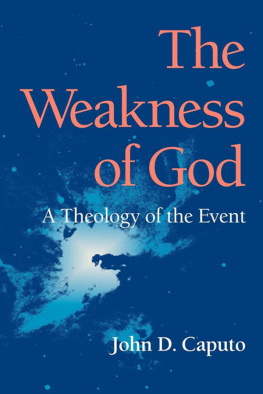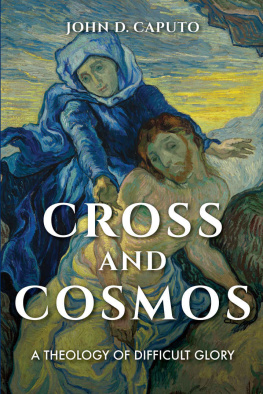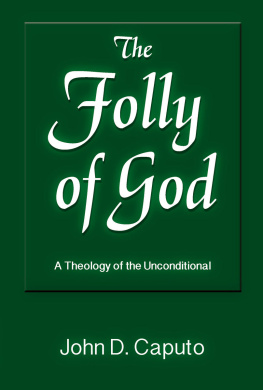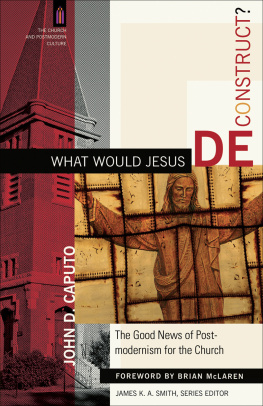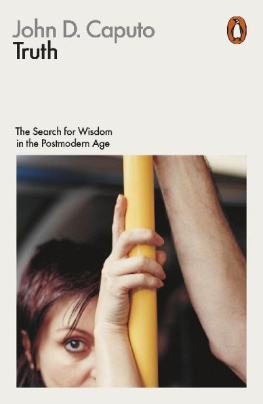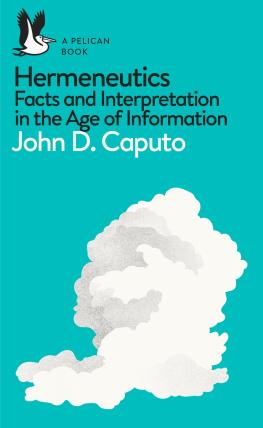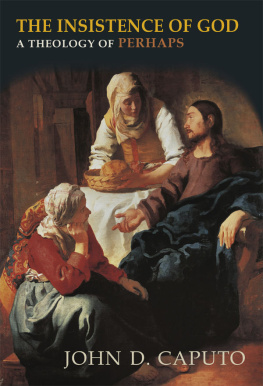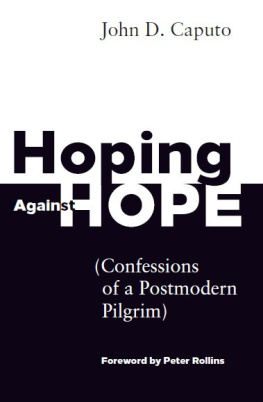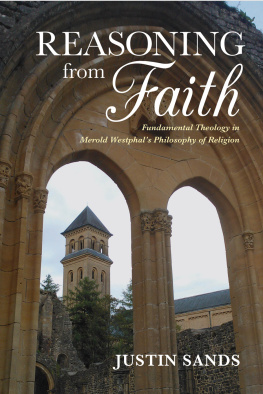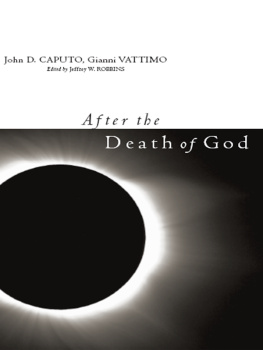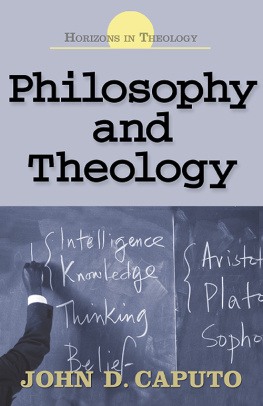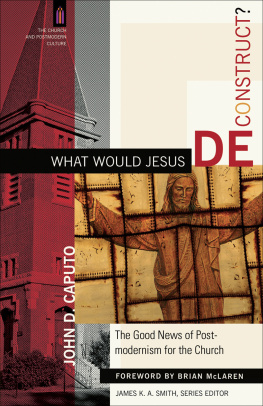THE WEAKNESS OF GOD
Indiana Series in the Philosophy of Religion
Merold Westphal, general editor
The Weakness
of God

A Theology of the Event
JOHN D. CAPUTO
Indiana University Press
Bloomington & Indianapolis
This book is a publication of
Indiana University Press
601 North Morton Street
Bloomington, IN 47404-3797 USA
http://iupress.indiana.edu
Telephone orders 800-842-6796
Fax orders 812-855-7931
Orders by e-mail iuporder@indiana.edu
2006 by John D. Caputo
All rights reserved
No part of this book may be reproduced or utilized in any form or by any means, electronic or mechanical, including photocopying and recording, or by any information storage and retrieval system, without permission in writing from the publisher. The Association of American University Presses Resolution on Permissions constitutes the only exception to this prohibition.
The paper used in this publication meets the minimum requirements of American National Standard for Information SciencesPermanence of Paper for Printed Library Materials, ANSI Z39.48-1984.
MANUFACTURED IN THE UNITED STATES OF AMERICA
Library of Congress Cataloging-in-Publication Data
Caputo, John D.
The weakness of God : a theology of the event / John D. Caputo.
p. cm. (Indiana series in the philosophy of religion)
Includes bibliographical references and index.
ISBN 978-0-253-34704-6 (cloth : alk. paper) ISBN 978-0-253-21828-5
(pbk. : alk. paper) 1. God. I. Title. II. Series.
BT103.C37 2006
231dc22
2005024892
2 3 4 5 11 10 09 08 07
To Sabrina, Joel, and Natalie
and to all those to come
Mes amis, je vous remercie dtre venus. Je vous remercie pour
la chance de votre amiti. Ne pleurez pas: souriez comme
je vous aurais souri. Je vous bnis. Je vous aime.
Je vous souris, o que je sois.
My friends, I thank you for coming. I thank you for the
good fortune of your friendship. Do not cry: smile as
I would smile at you. I bless you. I love you.
I am smiling at you, wherever I am.
The final words
of Jacques Derrida (19302004),
read by his son at his graveside
CONTENTS
3. The Beautiful Risk of Creation: On Genesis
ad literam (Almost)
4. Omnipotence, Unconditionality, and the
Weak Force of God
Hermeneutical Interlude: Two Keys
to the Kingdom
6. Hyper-Realism and the Hermeneutics
of the Call
Part Two. The Kingdom of God:
Sketches of a Sacred Anarchy
7. Metanoetics: The Seventh Day, or Making
All Things New
8. Quotidianism: Every Day, or Keeping
Time Holy
9. Back to the Future: Peter Damian on the Remission
of Sin and Changing the Past
10. Forgiven Time: The Pharisee and the
Tax Collector
11. Lazarus, Come Out: Rebirth
and Resurrection
12. The Event of Hospitality: On Being
Inside/Outside the Kingdom of God
Appendix to Part Two: Newly Discovered
Fragments on the Kingdom of God from
The Gospel of Miriam
PREFACE
As I put the finishing touches on this book, the world reels under the overwhelming violence of the tsunami (sea wave) that occurred on the day after Christmas 2004, which destroyed the lives and property of hundreds of thousands of people in south Asia.
Predictably, many religious leaders have been rushing to the nearest microphone or camera to explain that, while these are all innocent victims, we cannot hope to explain the mystery of Gods waysimplying that this natural disaster is something God foresaw but for deeper reasons known only to the divine mind chose not to forestall. Others are telling us that God has taken this terrible occasion to remind us that we are all sinners and to dish out some much-needed and justifiable punishment to the human race.
Tell that to the father who lost his grip on his three-year-old daughter and watched in horror as she was carried out to sea.
Those are blasphemous images of God for me, clear examples of the bankruptcy of thinking of God as a strong force with the power to intervene upon natural processes like the shifting movements of the crustal plates around the Pacific rim as our planet slowly coolsthe decision depending upon what suits the divine plan.
One can look upon the book that follows as an attempt to think of God otherwise.
January 2005
ACKNOWLEDGMENTS
My thanks to Villanova University for several research leaves during which the work on this book was completed, and in particular to Dean Kail Ellis, O.S.A., and Dr. John Johannes, Vice-President of Academic Affairs, who have been so supportive of my work over the years. Anna (Misticoni) Monserrate, the secretary to the David R. Cook Chair, has as always been an indispensable aid to me. I am grateful to Steven Jungkeit, Catherine Keller, and B. Keith Putt who have been especially helpful readers of various stages of sections of this manuscript. I have also benefited from several comments by my new colleagues in the Religion Department at Syracuse University.
While the great majority of this manuscript is previously unpublished, some sections of the following chapters appeared in earlier versions, most of which have been so completely revised and reinscribed in a new context that I hesitate even to mention them. But for the sake of the official record, antecedent versions of some sections of the following chapters can be located as follows:
: In Search of a Sacred Anarchy: An Experiment in Danish Deconstruction, in Calvin Schrag and the Task of Philosophy after Postmodernity, ed. William McBride and Martin Matuskik (Evanston, Ill.: Northwestern University Press, 2002), 22650.
: The Poetics of the Impossible and the Kingdom of God, in The Blackwell Companion to Postmodern Theology, ed. Graham Ward (Oxford: Blackwell, 2001), 46981.
: Metanoetics: Elements of a Postmodern Christian Philosophy, Christian Philosophy Today, ed. Francis Ambrosio (New York: Fordham University Press, 1999), 189223.
: Reason, History and a Little Madness: Towards an Ethics of the Kingdom, in Questioning Ethics: Contemporary Debates in Philosophy, ed. Richard Kearney and Mark Dooley (New York: Routledge, 1999), 84104.
: The Time of Giving, the Time of Forgiving, in The Enigma of Gift and Sacrifice, ed. Edith Wyschogrod, Jean-Joseph Goux, and Eric Byonton (New York: Fordham University Press, 2002), 11747.
: No Tear Shall be Lost, in Ethics of History, ed. David Carr and Thomas Flynn (Evanston, Ill.: Northwestern University Press, 2004), 91117.
: Adieu sans Dieu: Derrida and Levinas, in The Face of the Other and the Trace of God: Essays on the Thought of Emmanuel Levinas, ed. Jeffrey Bloechl (New York: Fordham University Press, 2000), 276311.
THE WEAKNESS OF GOD
Introduction:
A Theology of the Event

I confess I have a weakness for theology.
Against the sound advice of my attorneys, my investment counselors, and my confessor, and after holding out for as long as possible against my inner daimon, I have finally succumbed to the siren call of this name. I do not know how to avoid speaking of theology. So be it. I am prepared to face the consequences. Hier stehe ich.
Whatever may be the fortunes of the word
Next page
